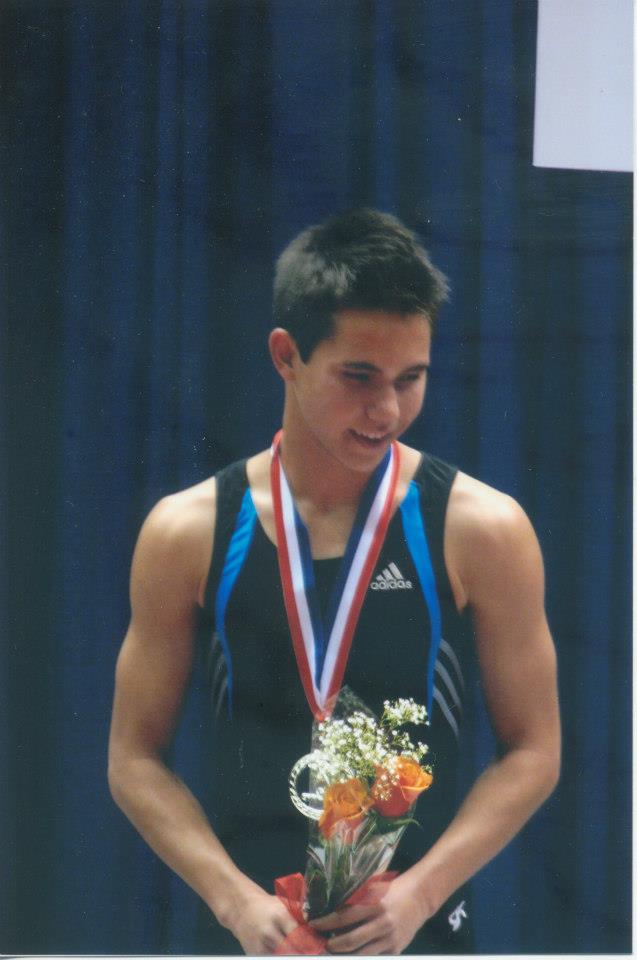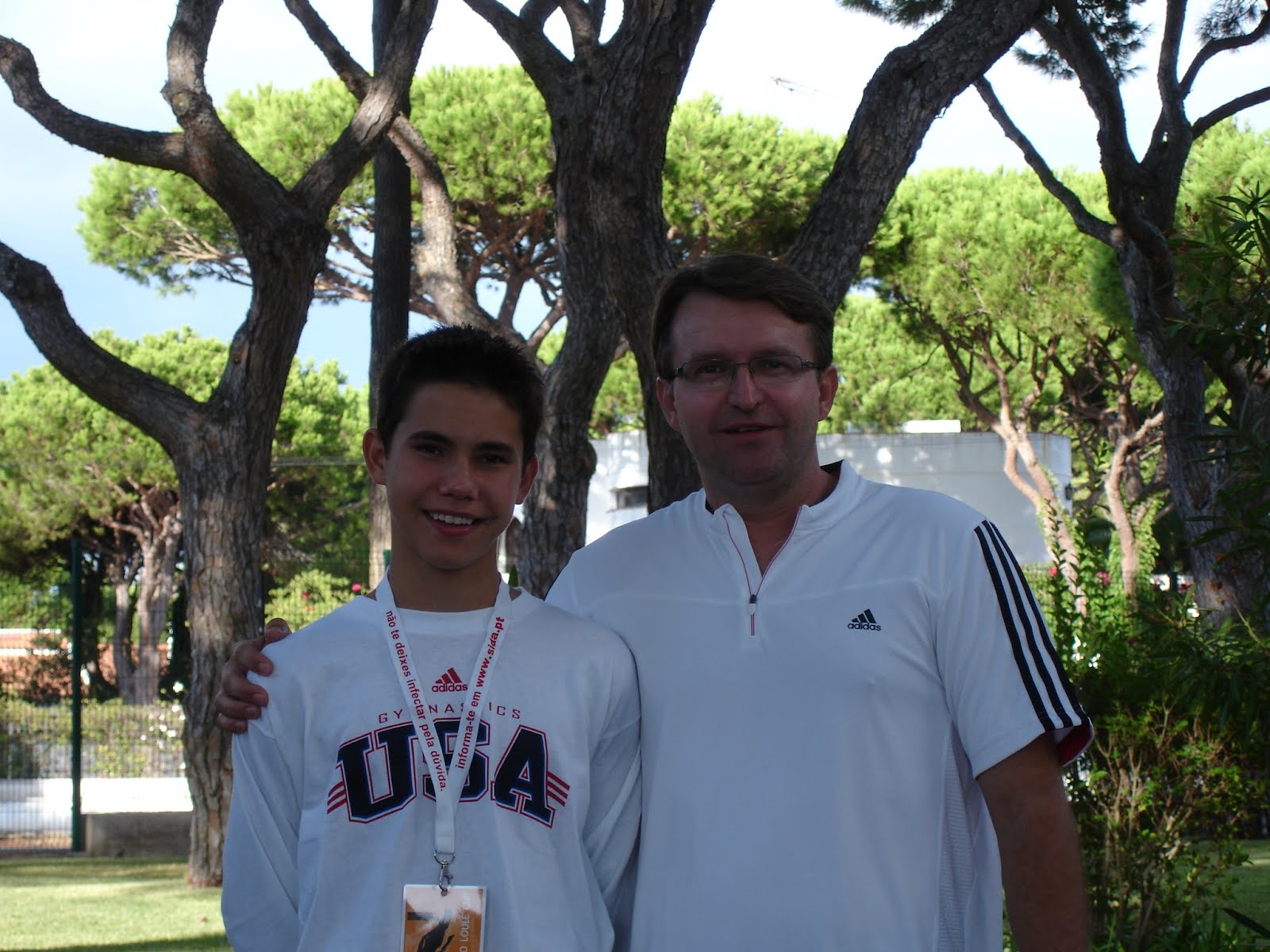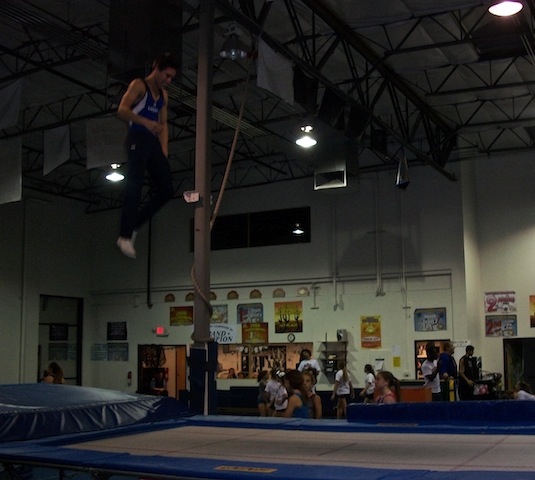
Noah Orr, represents more than just a young person making a name from for himself in sports. In a sense, he represents a dream. Aside from being one of the best trampolinists in Arizona, he is on course of a four-year plan that could land him in the 2016 Olympics.
AFM: What is trampolining? Is it similar to jumping on a trampoline in the backyard or completely different?
NO: Yes, it's definitely different. In trampolining you have to do ten 10 skills. Of those 10 ten skills, you have the skill and deductions and [it] has to be clean, i.e. like kicking out at the right time like in gymnastics.
AFM: How long have you been doing the sport?
NO: This is my eighth year.
AFM: How did you get involved?
NO: My mom signed me up for a trampolining safety class because the backyard trampoline at my house., I kept doing flips and my mom thought I was going to break my neck. So she signed me up for the class.
AFM: Did you like it right off the back?
NO: When I first did it I didn't know it was a sport. So I was going to this trampolining safety, class, the gym was actually a T&T gym; T&T is trampolining and tumbling. I started there and the coach eventually wanted me to join the team. My parent's were like, ‘"Trampoline team, what is that? Never heard about it before.’" So, anyway, when I joined, and started competing and I've just got better and better till until I've gotten to this point right now.
AFM: What drives you to be so good at it? Pure dedication or growth of sport?
NO: I love the sport, and the sport is really fun. It's definitely different than most other sports. If I had to relate it to another sport, it would be diving because of all the flips. So it's different and a lot of fun, but then I'd love to see the sport get bigger and bigger.
AFM: Take me through a day of your training.? Do you warm up or do you jumps?
NO: I do any of those. It depends on how I feel that day. Sometimes I'll start off with a run, sometimes with just stretching. Sometimes I'll start jumping on the trampoline to get my feet warmed up and my body and legs warmed up. Or I'll start off with different skills.
AFM: How long are your practices?
NO: I typically go about two or three hours a day, every day. Every day but Sunday.
AFM: Do you ever get tired of explaining on what trampolining is when people find out that you do it?
NO: It depends. If it happens a lot during the week, it can get boring. But if it's once in a while, then it's not bad. I kind of enjoy telling people.
AFM: You're a junior in high school. Do you find it hard balancing being a 17-year old, training, and competing?. Do you find it difficult balancing all three?
NO: Since it's my junior year, I have several tough classes, and because of that it makes it a little difficult when I'm gone. Like when I went to Portugal, I was gone for an entire week so for a lot of my classes I have to catch up on. Most of my teachers are pretty flexible---they'll say, ‘"You can come in, take as long as you need to get caught up and take the tests or whatever you missed.’" They're pretty good at that, but it's still tough. When I come back, I just study and make up all the work that I missed, so I don't have as much free time except for training, homework and go to school.
AFM: How was the trip to Portugal?
NO: I've been there before., I went two years ago. It was once again, amazing. Last time we [my coach and I] actually went was in 2010., that was when we went [me and my coach]. We arrived a day early and that was when we were able to go and visit places and see places. This time, I went with the National Team, so we were all together so we went to competition and came back; we watched other athletes and then came back.
AFM: Did you have any downtime?
NO: We had one day at the very end, but it wasn't too much.
AFM: What's up for you next?
NO: Right now, we're seeing for both worlds next year; age groups that is where all of the top athletes go there and that's the one we're going to try and get qualified for.
AFM: When you have competitions coming up, do you prepare differently?
NO: During the summer, typically, I'm cleaning up just skills; basic skills to help for bigger skills. So I'll start working the bigger skills, then go back to simpler ones to move over to the other ones. So I'll get that one correct, then I'm like alright, ‘"Let's go one more flip, or let's add another half-flip.’" And as you get better and better, you can get bigger and bigger tricks. That's typically what I do during the summer, when no competition's going on. But once competitions start coming up, I'll start doing more routines and then we'll basically clean up the routine and make it perfect.
AFM: Do you and your're coach collaborate on the routines? Or do you take that on yourself?
NO: It's more of a collaboration. I'll typically make the routine and then I'll show it to him. He'll be like, "’That's fine,” or he'll be like, ‘What about this?' And we'll both input on what we'd like to do, but I'll get the basic skeleton on the routine put together and then he helps out.

AFM: What's up for you next? Any time off or is it a constant year-round sport?
NO: It's typically a year-round sport. Competition season is from about December to about July, then after that there's free time. So if I wanted to take time off I could. Most of the time I just train, it's not crammed as much as it is when I am competing so it's kinda nice. If I wanted to I could take that time off, but I typically don't though.
AFM: With you there is the Olympic aspirations, do you have a lot of friends and family that support that your Olympics aspirationsas well?
NO: I get that all the time. I have school friends that are like, ‘"Are you going take me to the Olympics?’" So I have a lot of friends that always support me with that. I have my family, that tell me if I am making it, they'll come and see me. They're all really supportive, even people from my church.
AFM: What activities do you like in church?
NO: We have 'Young Men,' and that is the young men from our church they get together and have little activities. So we'll go do a sport, like okay, "Let's go play basketball tonight," and we'll go play basketball or do different activities like that. So we'll do that during the week and we also have church on Sunday. I get duties assigned to me sometimes from leaders for our church and sometimes have to do extra things.
AFM: What are some of your hobbies outside of trampolining?
NO: Outside of trampling, I work on art. I love drawling, drawling is one of my favorites. I'm actually getting pretty good at it. It's taken me like four years now, and I'm starting to actually see some a lot of improvements. It just takes some time, you just have to put in the effort. I do pole vault--I go to Pinnacle and and I do that during track season. So I'll go school, pole vault, here, and then do homework.
AFM: How do you have energy for all of that?
NO: I don't know. I have no idea how sometimes I can get through it.
The biggest hurdle that stands between Noah Orr and his Olympic aspirations is the money that is needed to get there. On an average, one ticket ranges from $3,000-$5,000. As Noah Orr continues to pursue his dream, which includes recently landing on the National Team and bringing home a bronze medal from the championship in Portugal, his positive attitude and humbleness are astounding. Noah works extremely hard at his craft, and not only has he made his parents extremely proud, he's made Arizona proud with the work and dedication he has shown at such a young age.
For additional information about Noah and to even donate to help him reach his dream, visit : http://www.indiegogo.com/projects/167618 and check out his Facebook page: https://www.facebook.com/pages/Noah-Orr/
